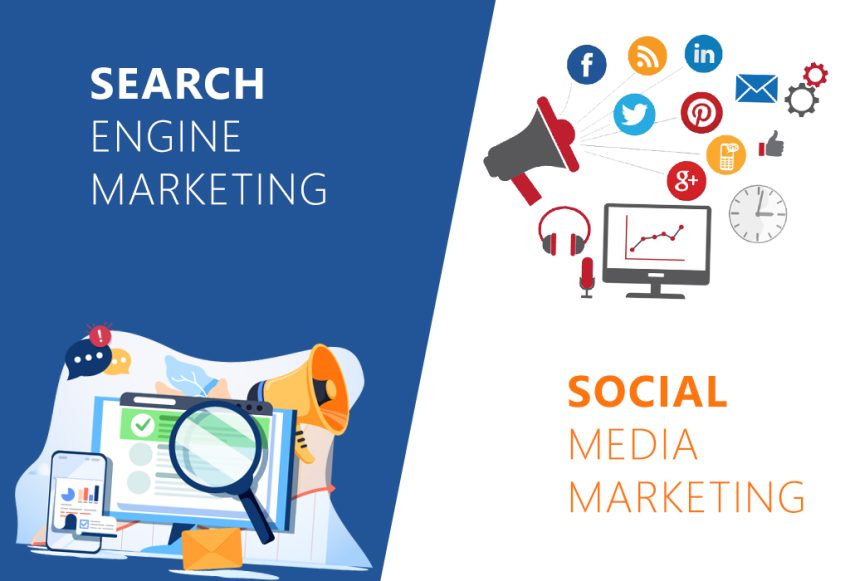In the ever-changing world of marketing through digital channels, Search Engine Marketing (SEM) and Social Media Marketing (SMM) have become effective tools to drive the success of online marketing. SEM concentrates on boosting website visibility by using search engines, whereas SMM utilizes social networks to interact and draw in viewers. If used strategically, SEM and SMM can increase brand recognition, and drive traffic which ultimately leads to greater revenue and conversion.
This article focuses on the importance and importance of SEM as well as SMM in today’s world of digital and the ways businesses are able to tap their power to attain digital success.
Table of Contents
Understanding SEM: Optimizing Search Engine Visibility
SEM refers to the use of paid-for advertising techniques to boost the visibility of a website’s content on search engine result pages (SERPs). One of the most important aspects of SEM is the pay-per-click (PPC) advertisement, in which advertisers place bids on keywords that are relevant to their public. If users search for those words, the advertiser’s advert is displayed on the right or top of search results and drives targeted traffic to their site.
The primary benefit of SEM is the ability to offer immediate visibility and immediate traffic. Furthermore, SEM allows advertisers to precisely target their audiences by analyzing factors like geography, demographics, and search intent. By constantly monitoring and improving the effectiveness of their SEM campaigns, companies can increase the return on investment (ROI) and increase conversion rates.
Unleashing the Potential of SMM Engaging Your Audiences with Social Media
SMM concentrates on using various social platforms in order to communicate and interact with an audience. Platforms like Facebook, Instagram, Twitter, and LinkedIn give businesses an opportunity to boost brand awareness and build customer loyalty and boost visitors to their websites. With compelling content, companies can build meaningful relationships with their fans, resulting in a higher engagement rate and conversions.
One of the main benefits of SMM is the ability in gaining access to a huge audience on social media sites. They offer powerful targeted options for businesses to reach their target audience based on demographics habits, and interests. Through the creation of pertinent and easily shared content companies can increase their reach by sharing it organically which can further boost the visibility of their brand.
Combining SEM and SMM: A Dynamic Duo for Digital Prosperity
Although SEM, as well as SMM, are successful strategies in their own right but combining them together can produce better outcomes. When combining SEM and SMM strategies, companies can come up with a complete digital marketing strategy that can maximize the visibility of their websites.
One way to make the synergy of SEM in conjunction with SMM is to use social media platforms to supplement SEM campaigns. Businesses can, for instance, utilize social media platforms to advertise their PPC advertisements to a wider public and drive more clicks. By ensuring that the message is aligned and goals over SEM and SMM businesses can enhance their brand’s message and boost the overall performance of their campaigns.
Additionally, data in SEM campaigns can also provide useful insights for SMM strategies. Through analyzing the keywords that lead to conversions using SEM companies can pinpoint themes and trends to guide the creation of content in social media. This approach is based on data and ensures that companies are providing relevant and interesting content to their social media users which increases the likelihood of increasing conversions.
The most important metrics for success Measure the Effect on the Performance of SEM and SMM
To evaluate whether or not it is effective SEM and SMM initiatives, companies need to track and evaluate the performance of their key indicator of success (KPIs). For SEM the most important metrics are click-through rates (CTR) as well as conversion rate, and cost per conversion. These measures help companies understand the effectiveness of the impact of their PPC campaigns and assist in making educated decisions regarding optimizing their advertising budget.
In the context of SMM the metrics of reach, engagement rates, and conversions that are attributed to social media could give insight into the effectiveness of campaigns using social media. Furthermore, businesses can utilize the tools for social media analysis to measure the growth of followers, and content performance as well as sentiment analysis and other pertinent metrics to gain knowledge of the impact and efficacy of SMM strategies.
In the end
By understanding the importance and importance of SEM as well as SMM and successfully harnessing their power companies can achieve digital success increase their reach and meet their marketing goals in the ever-changing online marketplace.
Read Also What Are The Main Aspects Of Digital Marketing For SEO?

